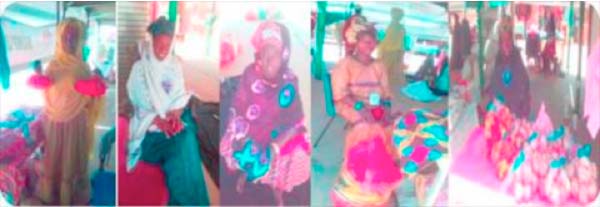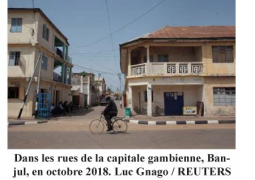
Women
gardeners in the business of locally produced onions in the country have said
that the news from the government to the Gambian people that the restrictions
and ban on onion importation has been lifted. They said that now anyone can
import onions and that this was very unfortunate and ‘bad news’ for them.
Perhaps
your office has a better response to the concerns raised by our mothers,
sisters, aunties and loved ones in onion gardening and selling.
However,
Mr President, the democratic state that the Gambian people voted for want it to
be inclusive and favourable to all including these women. The nation must not
only be enjoyed by the rich and the powerful.
Mr
President, during your recent ‘Meet the People’ tour did you take a walk to one
of the local gardens in any part of the country where women till the soil so
hard, bending under the hot sun, using their traditional wooden tools? They
strive to ensure that at the end of the day they will have a good harvest.
Have
you seen the nature of the roads they use to go to these gardens? Have you seen
the nature of the wells they dig to access water? Have you seen how narrow and
isolated those gardens are? Do you know what they go through and the type of
locally made fertilizers they use to make their gardens safe from pests?
They
wake up in the morning and work on their gardens from sunrise to sunset. Some
of them camp and cook there just to make sure that they have the best onions.
Mr
President, in the last 22 years, the market for them was not favourable because
their products were competing with that of the former head of state that has
all the equipment at his disposal.
These
women, after tilling the soil hard with their bare hands, are paid less for
their onions and sometimes there is no one to buy from them.
Amie
Secka from Niamina East in the Central River Region said she has a big garden
where she produces tonnes of onions.
She
said for gardeners like her, allowing importation of onions into the country
would mean spoiling the market for them.
She
said: “When people start to import onions here, our own onions will not be
sold, our onions will be spoiled as there will be no market for them. We don’t have the power to build our own
storage facilities to store our onions while selling them bit by bit.”
Amie
said the government should place an embargo on onion importation when
locally-produced onions are in the market and remove the embargo when the
onions are finished.
“With
support from the government, what we produce from our various gardens across
the country can supply the entire country,” the woman gardener said.
Mr
President they voted for you so that you would help them with tools,
fertilizer, boreholes and good roads for easy access to their gardens.
They
had hoped for a level playing field. When they voted they never thought that
such a decision would be taken without them being put in the limelight.
Most
of the women and men in suits and ties and most of the school going boys and
girls in uniforms have had their school fees paid by their mothers who are
women gardeners.
Women
gardeners and farmers have nothing at their disposal other than their strength
and the passion they have to make life better for their children.
Fatou
Darboe, from Brikama, said she is a market vendor and gets her onions from
local women gardeners to sell at the market.
She
said she was saddened by the news of the government’s removal of the import ban
on onions because it is from onion sales that a lot of women earn their living.
She
also suggested that the government should make it policy for at least three
months that when the locally-produced onions are in the market, there should be
no imports of onions.
“That
will be somehow helpful,” she said with a sigh of frustration.
Mr
President we would rather have our mothers as gardeners, tilling the soil day
and night, than sitting at the street corners begging for survival
But we cannot be assured that they will
continue to till the soil when their labour is been hijacked by the rich and
the mighty.
If our mothers till the soil day and night but
do not have a market to sell their products, do not have a good storage
facilities to keep their onions from rotting and the rich, who are mostly men,
are allowed to import onions into the country, then we are sending them back to
poverty.
In
their gardens they have no one and no help but themselves and yet still they
are happy because this is what they believe in and it is their only means of
earning a decent living.
When
their onions are due for harvest that is the time the thieves will also fasten
their belts and start stealing from them. Yet they take it and hardly ever
report it to the police. The garden women, our mothers, sisters, aunties,
nieces and daughters are indeed honourable.
Mariama
Fofana, from Badibu Salikenni in North Bank Region, said “That the government
should tell people to go outside and buy what is already produced in the
country is “very unfortunate”.
She
said: “I am appealing to the government
to get us markets to sell our onions first before asking others to import
onions.”
Ramatoulie
Manneh of Jarra Madina said they produce tonnes of onions at their garden back
home.
She
said their onions are ready for the market but whenever they go to the lumos
(local weekly market) with their onions, they now come back home with them.
“We
don’t have anywhere to store it so some of the onions already started to
spoil,” she lamented, adding that what the government should do is to help find
markets for the locally-produced onions and not import onions.
Ramatoulie
said with the huge garden they have, they can supply the country with onions
when supported by the government.
Fatou
Ceesay from Batinjon said she is not sure whether the locally-produced onions
could satisfy the entire country but what they want is for their onions to be
sold first.
Awa
Jallow from Kembujeh Madina, Nyima Kanteh Jara of Pakalinding, and Fatoumata
Fadera from Badibou Sanjal Sara Kunda all re-echoed similar sentiments.
They
all appealed to the government to look into their concern vis-a-vis onion
importation.
Mr
President these are your women. The women of this great nation are appealing to
you to revisit your decision and see how best it can work out in their
interests as well.
They
are saddened by the news because they have no power to compete with those that
will be importing onions. With your help they can stand a chance of selling
their products.
We
hope that the Ministry of Agriculture under OJ’s leadership will tackle these
concerns at his level as well and look for ways and means of securing the
interests of the garden women.
All
the same, we congratulate the NEMA Project for sponsoring these women to take
part in the GCCI Trade Fair and for helping them in their Garden work.
We
equally call on them to help with storage facilities where the women can store
their onions while waiting to sell them.


